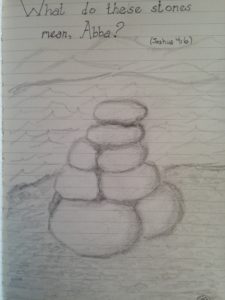
In school, each student is given a grade the she alone has worked for. Team projects are the exception, and a dreaded one at that.
Even in the Christian faith we stress the individual’s responsibility to accept or reject Jesus Christ. (I’ve written about this twice before, based on my first experience in Ethiopia. You can read those posts from 2015 and from 2008 if you want.)
But there is power in community, especially when it comes to making decisions. I recall a scene in a documentary from many years ago: the elders of an African tribe sitting in a circle discussing the appropriate marriage dowry for one of the girls in the tribe. Even as I write that i struggle with how wrong everything about it sounds – but only because it is foreign to me; I also see great wisdom.
Imagine if we were to harness the power and wisdom of collected minds for such things as job changes and career moves; for engagements (or divorces!); for discerning God’s call on our lives.
My parents recently gave me a number of books they’ve read over the years; the one at the top of this post among the titles. I just started reading it but wish I’d read it six months ago. Or three years ago. or twenty years ago. Listening Hearts: Discerning God’s Call in Community provides sound biblical and practical wisdom for a community of Christ-followers to listen for and to God’s call. The authors and a team of researchers combed through centuries of Christian literature to learn how previous generations and various traditions defined and discerned God’s call – for the community and for individuals within the community. Here are just a few tidbits that have stuck out to me:
Call may be emphatic and unmistakable, or it may be obscure and subtle. (p. 7)
We often find our calls in the facts, circumstances, and concrete experiences of life. … A call may not be so much a call to “do” as to “be.” (p. 9)
Discernment requires our willingness to act in faith on our sense of what God wants us to do. (p. 27)
If you are wondering what you should be doing; if you are facing a decision about a career change or a cross-country move or whether God is calling you to be in full-time ministry, then I want you to do this: read this book, get a small community of people around you (who should also read it), then listen together for to discern God’s call.

 Since I was a boy, I’ve had an aversion to dental work. I have avoided dentists as much as possible—probably why I need to see them more than I do. My last couple visits were beyond my control: one was to replace a twenty-year-old crown that broke, and the most recent was to repair a tooth that had chipped.
Since I was a boy, I’ve had an aversion to dental work. I have avoided dentists as much as possible—probably why I need to see them more than I do. My last couple visits were beyond my control: one was to replace a twenty-year-old crown that broke, and the most recent was to repair a tooth that had chipped.
 Remember. It’s one of my favorite words in Scripture. It shows up 187 times in the Old Testament alone; fifty more in the New Testament. Remembering is central to the Jewish feasts and fasts; it is central to the two ordinances Christians around the world celebrate today: the Lord’s Supper and Baptism.
Remember. It’s one of my favorite words in Scripture. It shows up 187 times in the Old Testament alone; fifty more in the New Testament. Remembering is central to the Jewish feasts and fasts; it is central to the two ordinances Christians around the world celebrate today: the Lord’s Supper and Baptism.